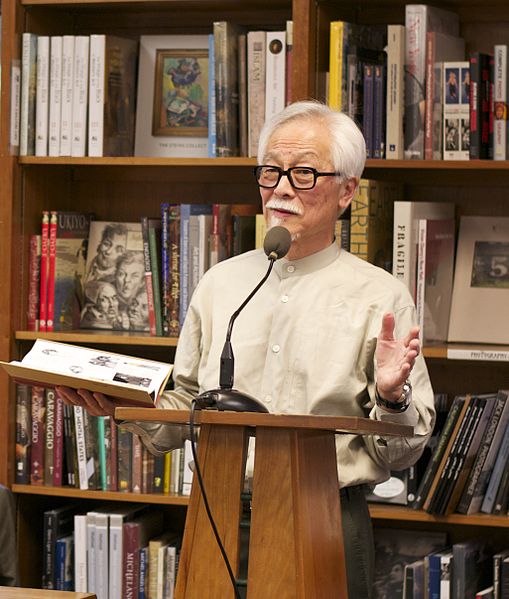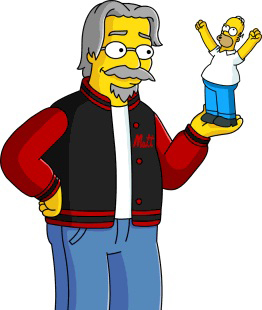Portland cartoonist Joe Sacco tells personal stories of the victims of contemporary and historical struggles by applying the artistic and literary conventions of comics to war reporting. Inserting himself into his reporting of real-time fighting and migration, he adds realism to his work and draws readers into the lives of his characters. His books received the American Book Award (1996) and the Eisner Award for Best Original Graphic Novel (2010), as well as the British Eagle Award from fans voting for the best comic book in 2001. Footnotes in Gaza won the Ridenhour Book Prize (2010) and the first Oregon Book Award for Graphic Literature (2012). He also won Time magazine’s Best Comic Book of 2000 award and a Guggenheim Fellowship (2001).
Joe Sacco was born on October 2, 1960, in Kirkop, Malta, a Mediterranean archipelago south of Italy. His parents, Leonard and Carmen Sacco, had survived the bombing of Malta during World War II, and the family immigrated to Australia when Joe was a year old. As a child living outside Melbourne, he heard stories of the conflicts in the Middle East and later remembered commemorations of World War II, which aroused his interest in uncovering conflicts in the war zones of his own time.
When Sacco was twelve years old, his father secured a visa to immigrate to the United States to work as an engineer. The family lived for two years in Inglewood, California, and in 1974 moved to Beaverton, Oregon, where fourteen-year-old Joe attended Sunset High School and contributed to and later edited the Sunset Scroll, the school paper. He had begun drawing comics as a child and began working on a comic about the Vietnam war, inspired by the political and satirical work of Bill Griffith, the creator of “Zippy,” and Gilbert Shelton of “The Fabulous Furry Freak Brothers” fame.
After graduating from the School of Journalism and Communication at the University of Oregon in 1978, Sacco tried several outlets as a cartoonist, journalist, and editor. He contributed a semi-regular comic strip called “Painfully Portland” to Willamette Week, published in comic magazines such as Prime Cuts and Real Stuff, and was editor of a now-defunct Portland weekly, The Downtowner, in the early 1980s. In 1985, with Tom Richards (a local writer from the Portland stand-up comedy scene) as co-editor, he started Portland Permanent Press, a monthly newsprint satire magazine that featured the work of local cartoonists Matt Groening and John Callahan.
Sacco was a reporter for The Comics Journal, published by Fantagraphics Inc. in Seattle, which covers freedom-of-speech issues, and his comics about the music scene have appeared in Willamette Week. In 1988, he developed Yahoo, published by Fantagraphics, where he honed his style of combining autobiography and journalism with documentary realism, which he refers to as comics journalism.
In his work, Sacco has described and reflected on his own experiences, such as in “Voyage to the End of the Library” about his job at a public library. He traveled to Berlin in 1988 as a roadie with the Miracle Workers, an Oregon punk group, and designed their T-shirts and an album cover. He was also a poster artist for other music groups. “In the Company of Long Hairs” describes some of those adventures—reprinted in But I Like It in 2006—and he created comics about the Rolling Stones and American blues.
Sacco’s work also describes the experiences of people in war, including his mother’s recollections of the bombing of Malta in “More Women, More Children, More Quickly, Malta 1935-43” and “When Good Bombs Happen to Bad People.” His interest in World War I led to the wordless The Great War, July 1, 1916: The First Day of the Battle of the Somme, An Illustrated Panorama.
Six books form the core of his comics journalism: Palestine: A Nation Occupied; Safe Area Gorade: The War in Eastern Bosnia 1992–95; The Fixer: A Story from Sarajevo; Footnotes in Gaza; Journalism, a collection on Iraq, conflicts in Chechnya, African migrations to Malta, poverty in India, and the Bosnia Serb war crimes trials; and Paying the Land, on the Dene people of the Canadian Northwest Territories and attitudes about resource extraction and the effects of colonization. Sacco also collaborated with Pulitzer-Prize-winning author Chris Hedges to illustrate the New York Times bestseller Days of Destruction, Days of Revolt in 2012, a book on corporate capitalism. In 2016, Sacco produced a comic for Portland City Council candidate Chloe Eudaly’s fundraising campaign, produced after Eudaly and Sacco had spent time with people who experienced Portland’s rising rent hikes and home prices.
Joe Sacco’s comics are not polemical. They create access to people and their situations and allow his subjects to describe their own lives. His writing gives people voices, and his illustrations give them faces.
-
![]()
Joe Sacco.
Press photo by Don Usner, W.W. Norton & Company
-
![]()
Safe Area Gorazde: The War in Eastern Bosnia 1992-1995.
Fantagraphics Press
Related Entries
-
![Allen Say (1937-)]()
Allen Say (1937-)
Most of the books by artist and writer Allen Say are about his personal…
-
![Dark Horse Comics]()
Dark Horse Comics
Born of a maxed-out credit card and a passion for creator rights, Dark …
-
![Matthew Abram Groening (1954–)]()
Matthew Abram Groening (1954–)
Matt Groening, who grew up in Portland, created The Simpsons, the longe…
Map This on the Oregon History WayFinder
The Oregon History Wayfinder is an interactive map that identifies significant places, people, and events in Oregon history.
Further Reading
Campbell, Duncan. "I Do Comics, Nor Graphic Novels."The Guardian, March 19, 2019.
Jarman, Casey. “War, Ink: Joe Sacco, the Father of Comics Journalism, Returns to Palestine.” Willamette Week, December 15, 2009.
Marshall, Monica. Joe Sacco. New York, NY: Rosen Publishing Group, Inc., 2005.
Mohr, Gary. "Busman's Holiday: Sacco's Rock and Blues Comics 1988-2005." In But I Like It, by Joe Sacco. Seattle, Wash.: Fantagraphics, 2006.
Sacco, Joe. Journalism. New York, NY: Henry, Holt and Company, 2013.
Said, Edward. "Homage to Joe Sacco." In Palestine, by Joe Sacco. Seattle, Wash.: Fantagraphics, 2001.
Sanders, Barry. "Literary Arts Pairs with PNCA for Inaugural Graphic Lit Prize." Words Matter (Spring 2012).
Worden, Daniel, ed. The Comics of Joe Sacco: Journalism in a Visual World. Jackson: University of Mississippi Press, 2015.





